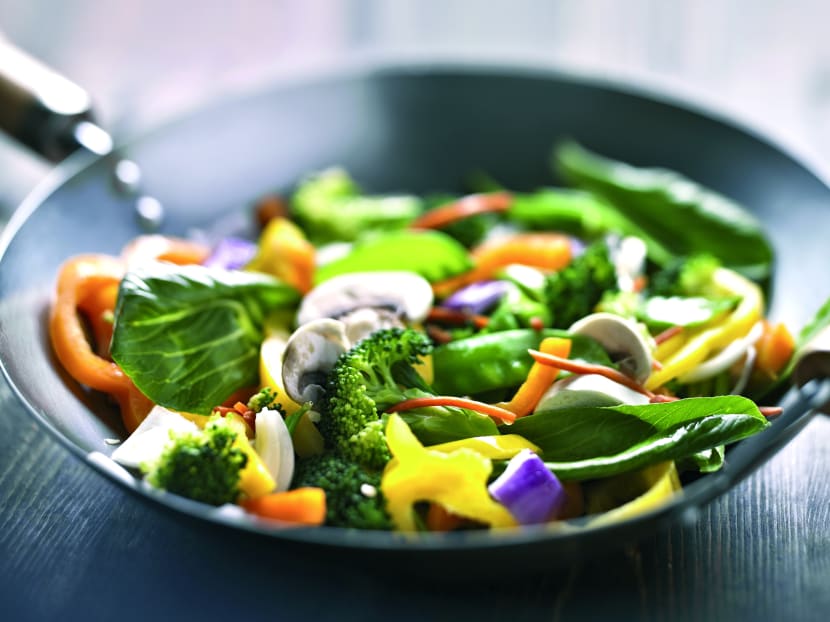Plant-based diet lowers risk of hip fracture: Study
SINGAPORE — What parents have been saying for generations about eating your greens does hold true after all. A long-term study, conducted by Duke-NUS Graduate Medical School and the National University of Singapore (NUS), found that a healthy diet rich in plant-based food such as vegetables, fruit and soya could reduce the risk of hip fracture by strengthening the bones.

The study identified two distinct Chinese dietary patterns — a vegetable-fruit-soya pattern and a meat-dim sum pattern, and found that participants who consumed food from the former pattern
had a lower risk
of developing
hip fractures.
Photo: THINKSTOCK
SINGAPORE — What parents have been saying for generations about eating your greens does hold true after all. A long-term study, conducted by Duke-NUS Graduate Medical School and the National University of Singapore (NUS), found that a healthy diet rich in plant-based food such as vegetables, fruit and soya could reduce the risk of hip fracture by strengthening the bones.
It also found that having a healthy diet, rather than focusing on a particular food or nutrient, could provide health benefits such as preventing chronic diseases.
The findings were derived from the Singapore Chinese Health Study, the largest population-based research conducted here, which looked into lifestyle and diet factors of major chronic diseases in Singapore, such as cancer, cardiovascular disease and osteoporosis. Previous findings derived from the study included the impact of eating Western fast food more than four times a week on the risk of dying from heart disease, and a lowered risk of liver cancer from drinking coffee.
Altogether, 63,257 Chinese men and women aged 45 to 74 years were enrolled in the study between 1993 and 1998. The participants were also restricted to two major dialect groups: Hokkien and Cantonese.
There were also follow-ups until December 2010 to monitor their risk of hip fractures.
The results of the study, published in last month’s edition of The Journal of Nutrition, identified two distinct Chinese dietary patterns — a vegetable-fruit-soya pattern rich in such food and a meat-dim sum pattern rich in red meat, processed meat and refined starchy food such as noodles. The findings were adjusted for age, body mass index (BMI), smoking and other risk factors for hip fracture in both men and women.
The participants in the top 20 per cent who consumed the most amount of food in the vegetable-fruit-soya pattern had a 34 per cent lower risk of developing hip fractures, compared with those whose consumption were in the lowest 20 per cent. There was no effect on the risk of hip fracture for those who consumed a diet rich in meat and refined starch.
The overall dietary patterns were also assessed using the Alternative Healthy Eating Index 2010 developed by the Harvard School of Public Health in the United States, based on food and nutrients protective of cancer, Type 2 diabetes and cardiovascular disease.
While the study recruited only Chinese participants two decades ago due to “scientific reasons and constraints of resources”, Duke-NUS and NUS Saw Swee Hock School of Public Health Associate Professor Koh Woon Puay, who led the study, said the results were generalisable to other populations or ethnic groups.
“There was no scientific reason for us to suspect that our findings will not be applicable to other races,” said Assoc Prof Koh.
“In our study, factors such as age, gender, body weight, level of education and smoking habit, which may be different in distribution among different ethnic groups, did not modify the effect of diet on hip fracture risk.”
She added that studies in the US and Europe have also found that a diet with a higher intake of fruit, vegetables and whole grains improves bone strength and reduces the risk of fractures.
“Hence, we feel that our findings will be helpful in promoting health among all Singaporeans,” said Assoc Prof Koh.
The study also cited hip fracture as constituting “the most serious complication” of osteoporosis and accounting for the majority of fracture-related mortality, morbidity and healthcare costs among those aged above 50 years.
It also said 50 per cent of total hip fracture incidence is projected to occur in Asia by 2050. Singapore was listed as one of the countries whose population has a high risk of sustaining hip fractures.
Assoc Prof Koh said the research team was in the process of looking into how the combination of lifestyle factors including diet, physical activity, BMI, smoking and alcohol consumption can come together to influence the risk of hip fracture.
“The mean age of surviving subjects in this cohort is now mid-70s,” she said. “We are going to start a follow-up study of assessing their health in ageing to see how this is affected by the way they lived in their mid-life.”









